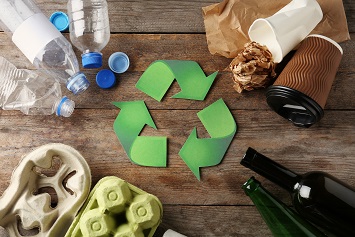On June 25, 2020, the EPA recognized eight initiatives by federal agencies for their efforts in increasing efficiency in their facilities in fiscal year 2019. The Agency is encouraging all businesses to follow their lead for the good of the environment and the bottom line.
“It is vital for federal agencies to lead by example in reducing environmental impacts,” said EPA Administrator Andrew Wheeler. “The efforts of these agencies not only benefit the environment but resulted in an estimated cost savings of $36.1 million to taxpayers across the federal government last year.”
According to the EPA, this year’s winners reduced their wastestream impact by:
- Recycling almost 180 tons of “end-of-life electronics to third-party certified recyclers”;
- “Diverting more than 600,000 tons of waste from landfills”;
- “Adding nearly 5,000 electric, hybrid, and alternative fuel vehicles to their fleets”; and
- “Recycling 180 million gallons of water.”
The following agencies were recognized for achieving the highest increased percentages over the previous year:
Waste:
- The Department of Veterans Affairs James E. Van Zandt VA Medical Center in Altoona, Pennsylvania, composted over 338 tons of materials relating to a stormwater retention swale and Victory Garden renovation.
Electronics:
- The Drug Enforcement Administration (DEA) Western Lab in Pleasanton, California, increased electronics recycled through a third-party-certified recycler or donated to colleges/universities by 92.9 percent.
- The Department of Defense Massachusetts (Barnes) Air National Guard, 104th Fighter Wing, in Massachusetts purchased 336 units of Electronic Product Environmental Assessment Tool (EPEAT)-certified Gold Level-registered equipment—a 34 percent increase—while diverting 2,619 pounds (lb) of electronic waste from municipal solid waste.
Purchasing:
- The Department of Veterans Affairs Minneapolis Veterans Affairs Health Care System in Minneapolis, Minnesota, purchased 31 percent less paper in fiscal year 2019.
- The Department of Veterans Affairs Manchester Medical Center in Manchester, New Hampshire, achieved a 6.6 percent (1,980-lb) reduction in copy paper use through default duplexing and enabling electronic meeting capabilities.
Water:
- The Department of Veterans Affairs Minneapolis Veterans Affairs Health Care System in Minneapolis, Minnesota, reduced its landscaping irrigation water usage by over 1 million gallons in fiscal year 2019.
Transportation:
- The Department of Veterans Affairs Central Arkansas Veterans Healthcare System in North Little Rock, Arkansas, reduced its internal combustion engine vehicles from 100 in 2018 to 11 in 2019, resulting in an 89 percent improvement.
- The Department of Energy Argonne National Laboratory in Lemont, Illinois, instituted a telework policy that decreased the number of commuting miles not traveled by 69 percent.
The Federal Green Challenge is part of the EPA’s Sustainable Materials Management Program (SMM). According to the EPA, the SMM is “a systemic approach to using and reusing materials more productively over their entire life cycles. It represents a change in how our society thinks about the use of natural resources and environmental protection. By looking at a product’s entire life cycle, we can find new opportunities to reduce environmental impacts, conserve resources and reduce costs.”
To improve organization efficiency in greener operations, the EPA encourages corporations to locate and utilize recycled content products, sign the America Recycles Pledge, and participate in partnership efforts with the EPA on one or more challenges:
- Partnership Opportunities in Sustainable Materials Management
- Food Recovery Challenge
- SMM Electronics Challenge
- Federal Green Challenge
- WasteWise
- Food Loss and Waste 2030 Champions
There is little doubt that green initiatives have a positive impact on the environment, but the positive impacts for businesses go even further. Being viewed as a company that values sustainability and environmental stewardship enhances the company’s reputation and positively impacts the brand. In addition, increased efficiency and waste reduction reduce costs, which is always important for business but even more so as companies struggle in the economic climate of the ongoing COVID-19 pandemic. Is participation in one of the aforementioned challenges or programs a way for your company to help manage costs in these challenging times?

